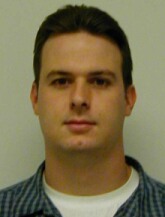|

|
Warp Processors:
Improving Software
Performance with Configurable Logic
Greg
Stitt
UC Riverside
Monday, March 1st,
2004, 4pm - 5pm
540A/B Cory Hall (D.O.P. Center Classroom)
|
Abstract
Processors that
dynamically optimize their software can improve speed and energy by
performing aggressive optimization on critical kernels and by tuning
those kernels to frequent data values seen at runtime. Additionally,
partitioning critical kernels onto a field-programmable gate array
(FPGA) coprocessor is known to achieve speedups and energy savings an
order of magnitude better than any software optimizations in many
cases. Until now, though, dynamic hardware/software partitioning was
never considered feasible. Previous work on binary-level
hardware/software partitioning, decompilation, and lean hardware
synthesis algorithms, shows that dynamic partitioning is indeed
feasible. In this talk, we present a new type of processor, which we
call a warp processor. A warp processor executes a standard software
binary on a traditional microprocessor, detects critical kernels, and
then automatically and transparently moves those kernels to an FPGA
coprocessor, essentially warping the execution time of each kernel by
an order of magnitude or more. We describe the architecture’s main
features, discuss design tradeoffs we considered, and provide initial
speedup and energy results for embedded system benchmarks.
Speaker
Greg Stitt is a PhD
student in the Department of Computer Science and Engineering at the
University of California, Riverside. His research interests include
hardware/software partitioning and low-power embedded system design.
Stitt has a BS in computer science from the University of California,
Riverside. He is a member of the IEEE.
|




